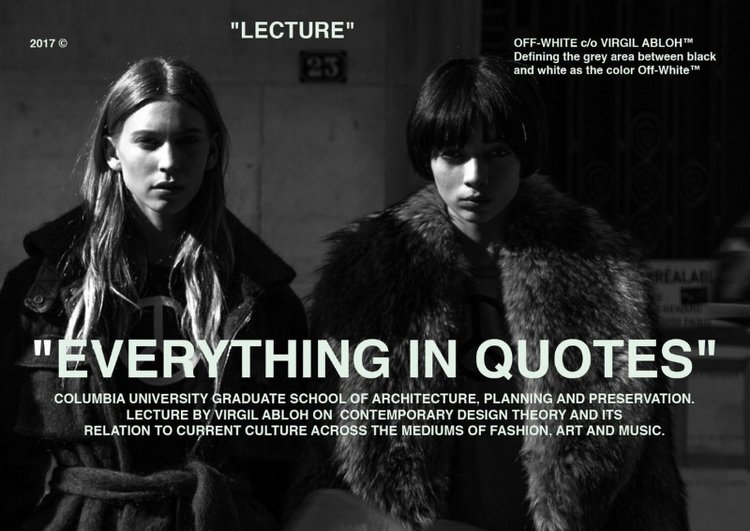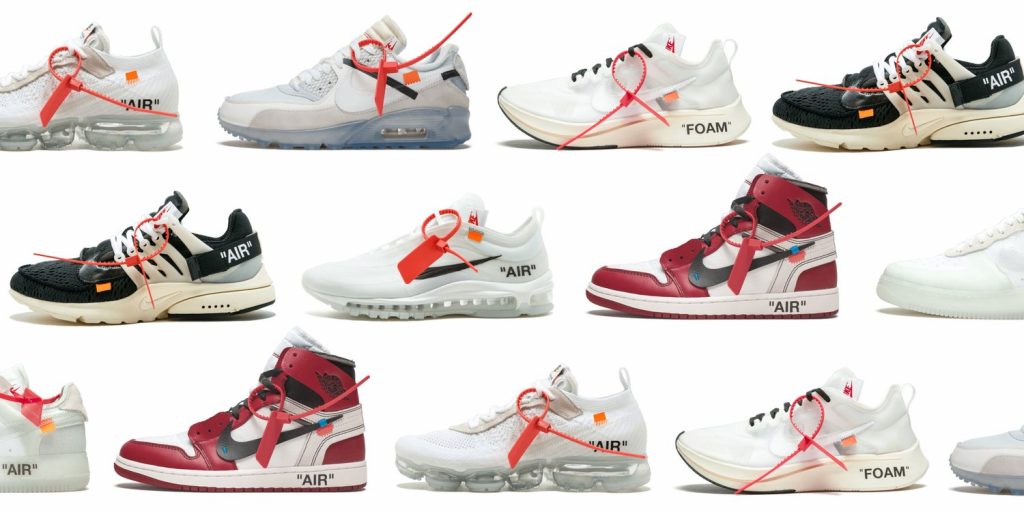“Why Does Virgil Abloh Put Everything in QUOTES?,” this is the question that Highsnobiety took on recently. The menswear site looked to an interview Abloh did with 032c, which stated: “Quotation marks are one of the many tools that Abloh uses to operate in a mode of ironic detachment … Abloh rejects the who-did-it-first mentality of previous generations in favor of the copy-paste logic of the Internet and its inhabitants. His new order is protected by a fortress of irony.”
Abloh, himself, told the bi-annual culture magazine: “You can use typography and wording to completely change the perception of a thing without changing anything about it. If I take a men’s sweatshirt and write “‘woman’ on its back, that’s art.” Magazine 032c has since revisited this question in an interview with Abloh, writing: “Even as we speak, [Abloh] asks that terms like ‘streetwear’ and ‘merchwear’ always appear in quotes in our printed interview.” Given Abloh’s increasing emphasis on the use of quotation marks and the frequency with which he is using them – appearing not only on his Off-White products, but also on goods associated with his collaborations with Nike, Ikea, and Rimowa – it might be worthwhile to inquire as to the legality of Abloh’s new design trademark – pun intended, maybe.
While it seems ludicrous that Abloh and Off-White could even potentially lay claim to quotation marks (and please do note, the brand is not actively attempting to do so), it is also not completely outlandish to suggest that one day it might try. Consider Off-White’s statement logo, for instance, which consists of the familiar set of diagonal stripes that prominently adorns crosswalks and street signs. It is the same graphic for which Off-White fans have come to associate with the brand (as indicated by the countless social media posts of cross walks and signs paired with Off-White shout outs and tags). Abloh’s brand has filed – and in some cases, received – federal trademark registrations. And in other cases, attempted to claim exclusive rights in these graphics.
Assuming that one day the Off-White legal team might attempt to claim rights over the use of quotations marks in connection with various goods, the question becomes: Is Abloh’s use of the quotations protectable by law? Trademark law – which provides protection for words, names, symbols, or designs (including logos, colors, sounds, product configurations, etc.), or any combination thereof used in commerce to identify and distinguish the goods of one brand from those of another – just might provide protection. Here’s why …
Unlike patent law, which specifically requires “novelty” in order for an applicant to receive protection – there is no such requirement for trademarks. Instead, the governing requirement is whether or not there is a “likelihood of confusion” between the proposed trademark (Off-White’s use of styled quotation marks around a single word or a few words in all caps in a specific font) and a mark already registered or in a prior pending trademark application owned by another party.

As noted by the U.S. Patent and Trademark Office (“USPTO”), it “determines that a likelihood of confusion exists when both (1) the marks are similar, and (2) the goods and/or services of the parties are related such that consumers would mistakenly believe they come from the same source.”
Trademark’s lack of a novelty requirement is good news for Abloh, since the use of quotation marks is hardly novel to him, or the Off-White brand. The not so good news: Since he is hardly the first one to use quotations, other brands have beaten him to the punch. A quick search of the USPTO’s database reveals a handful of trademark applications and registrations for various words in quotation marks for use on garments and accessories.
But alas, the benefit of being a well-known individual with a well-known brand is that consumers might actually come to associate the mark – the quotation marks around a word or words on garments and/or accessories – with Off-White. That is the central tenet of trademark law, after all: The ability of consumers to associate the mark – whether it be a word, a logo or some other design – with a brand. With that in mind and considering how the brand has managed to usurp some of the traditional meaning of striped street signs from municipal entities (as for whether the “average” consumer thinks of Off-White is another matter, of course), it might not be completely insane to suggest that in sue time Abloh’s legal team might file applications to register Off-White’s use of styled quotation marks around a single word or a few words in all caps in a specific font as a trademark.
(Note: While no trademark applications have been filed for Off-White’s use of quotations … yet, that does not necessarily matter. In the U.S. – where trademark rights are awarded on a first-to-use the trademark, not first-to-file a trademark application basis, trademark registrations are not necessary to gain/maintain trademark rights. Use in commerce, which is what Abloh is doing here, is how brands gain trademark rights. And to be frank, given that Ahloh’s mark – the quotations around a word or words – is not inherently distinctive … at all (aka the quotation marks are not automatically, on their own, capable of identifying the source of an Off-White product … because quotation marks primarily have other uses within the English language and have for many decades), he will have to demonstrate “secondary meaning” in the minds of consumers before any such rights can occur.
Secondary meaning is something that comes about as a result of use of the trademark over time, thanks to the help of advertisements bearing such uses, third party media attention of these uses, etc. Only then will Abloh/Off-White enjoy trademark rights over the mark. With that in mind, by actively using the mark and popularizing it in the minds of consumers, Abloh might be on his way to potentially achieving secondary meaning and thus, rights in the quotations as a trademark, regardless of whether trademark applications are filed.)
As for the theoretical statements that Abloh is making with his use of the quotations, I will leave you to ponder that on your own.













